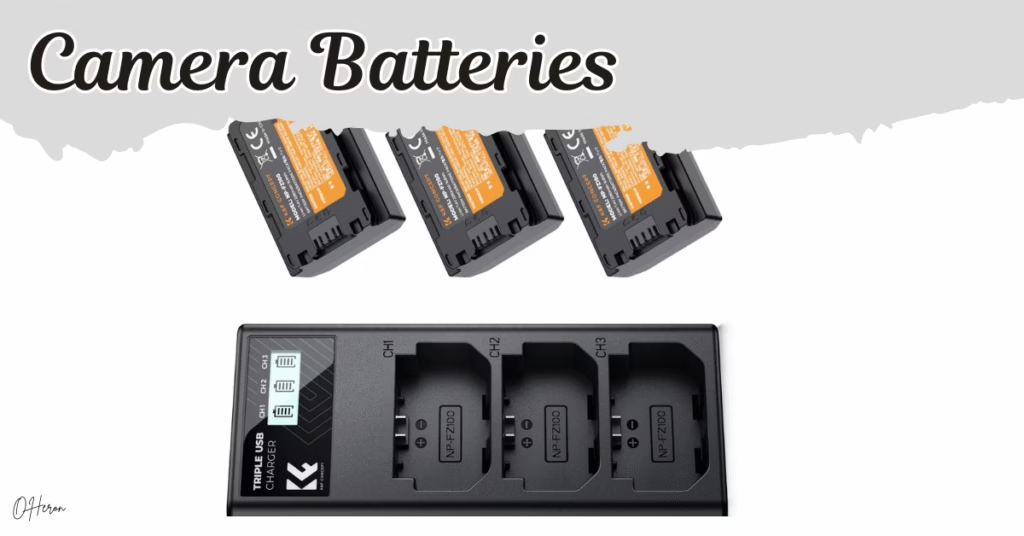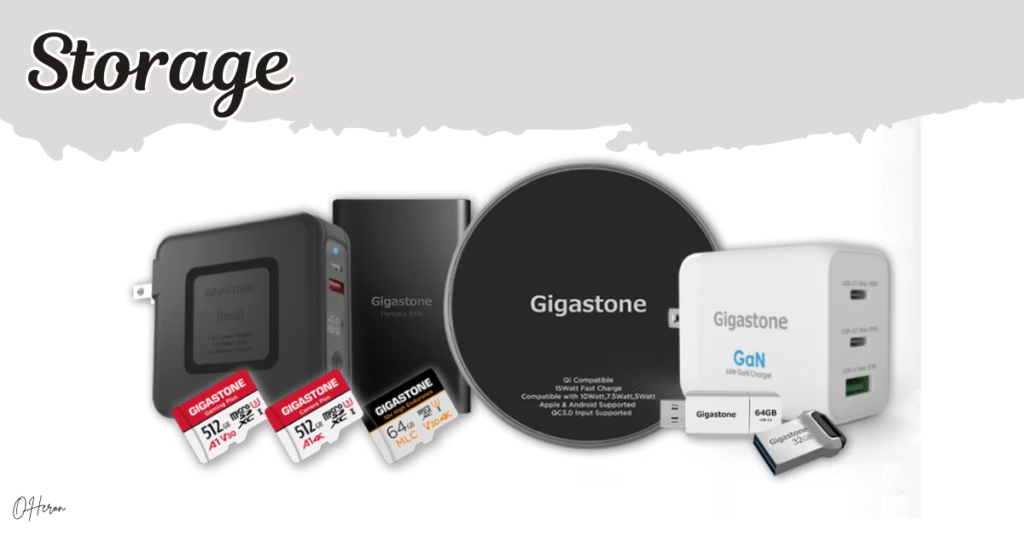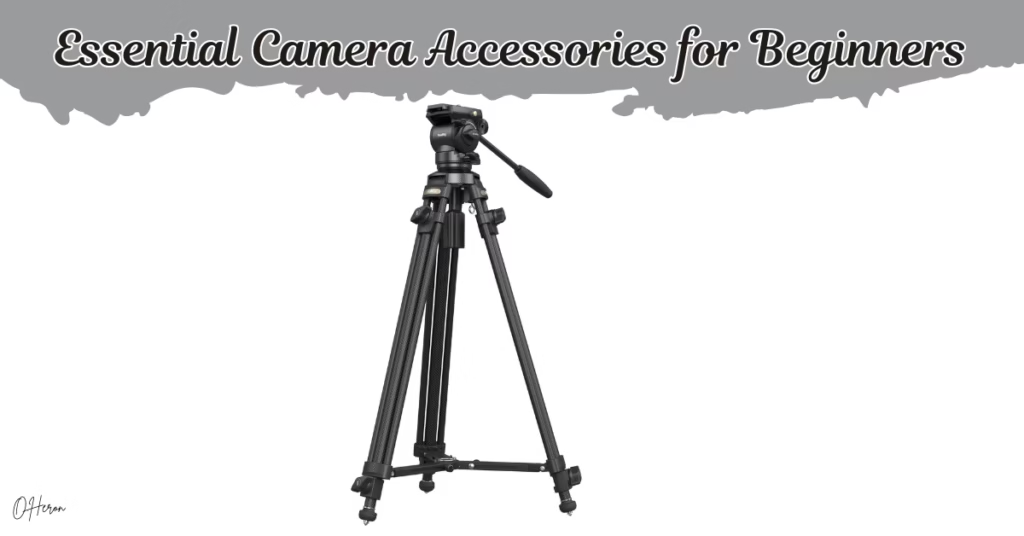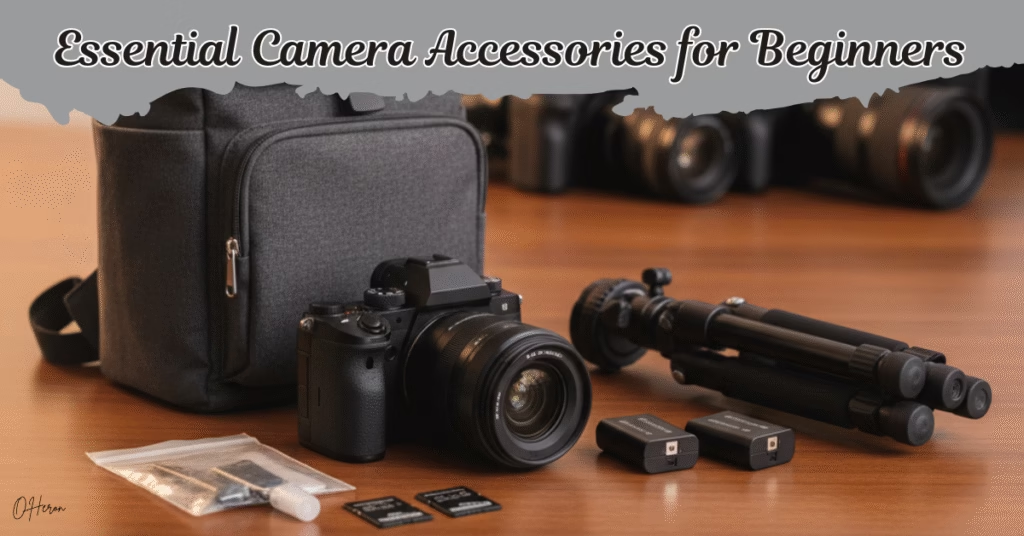Table of Contents
Starting to take photos is truly bundle of Joy! But looking at all the camera gadgets in stores can be confusing, like a big, messy toy box. The secret is, you don’t need all that gear! You only need a few special helpers. These special helpers are the most important camera accessories for beginners. We’re going to help you pick the best helpers, so you know what to buy first and what to save for later. This way, you can spend your money on the things that will really help you take amazing pictures!
How to Think Like a Smart Buyer
Before spending, ask: Will this improve my photos or just my shelf look? If it helps you shoot more, learn faster, or protect gear, it’s useful. These are the true must-have camera accessories. Conversely, if it’s primarily for marketing hype, skip it. Moreover, prioritize durability and compatibility: cheap replacements can cost more in the long run if they fail mid-shoot when building your camera starter kit.

Essential: Extra Camera Batteries
Why Batteries Are the #1 Must-Have
Batteries die at the worst moments. Therefore, carrying spares is non-negotiable. Extra batteries are good insurance against losing a session to power failure, a crucial part of any beginner photography essentials list. Modern mirrorless bodies often consume more power, so planning battery swaps is essential for camera accessories.
OEM vs Third-Party: What to Know
Original manufacturer (OEM) batteries usually offer the best reliability and safety. However, reputable third-party brands can be fine and often cheaper, making them more affordable beginner camera gear. If using third-party cells, buy from known brands with good reviews, and avoid generic no-name options.
How Many to Carry and Charging Tips
Carry at least one spare for casual shoots and 2-3 for long sessions or travel. Also, invest in a dual external charger so you can charge two batteries on the go. Finally, charge batteries fully the night before a planned shoot and keep them in a cool, dry place.

Essential: Memory Cards & Storage Solutions
Why Speed and Reliability Matter
Memory cards are where your work lives—losing one can mean losing images. Therefore, choose cards with reliable brands and the right speed class for your needs when selecting memory cards for beginners.
Speed Ratings to Know (UHS, V30, U3)
For stills, UHS-I U1 or U3 is common; for video or burst shooting, aim for U3 / V30 or higher. In short: higher rating = faster write speed = less chance of buffer bottlenecks.
Card Sizes, Backups, and Workflow
Instead of one giant card, use two mid-sized cards (e.g., 64GB). This reduces risk if one fails. Additionally, adopt a simple backup routine: copy cards to an external drive after each shoot, then to cloud storage. Redundancy saves heartbreak.

Essential: A Sturdy Tripod
Why Tripods Remain Indispensable
Tripods give you sharp photos in low light, enable long exposures, and help compose more deliberately. Consequently, they unlock techniques that handheld shooting cannot, making a quality photography tripod for beginners essential.
Key Tripod Specs for Beginners
Look for:
- Load capacity greater than your camera + heaviest lens,
- Stability at full height and low height,
- A weight that balances portability and sturdiness,
- A ball head or 3-way head that you find intuitive.
Travel vs Studio Tripods
If you travel, prioritize lightweight carbon fiber or aluminum travel tripods. For studio or home use, a heavier, more rigid tripod is fine. Also, check quick-release plate systems for fast mounting.
Essential: Protective Camera Bag
Types of Camera Bags and Why They Matter
A good camera bag for beginners protects gear and makes it easy to carry. Choose between:
- Backpack — best for day trips and travel.
- Sling bag — quick access for street photography.
- Shoulder/messenger bag — stylish and convenient for short shoots.
What Padding and Compartments to Look For
Your bag should have padded dividers, a separate lens pocket, and space for accessories (batteries, cards, filters). Additionally, weather resistance is a plus—look for water-repellent fabrics or a rain cover.
Essential: Lens Cleaning Kit
What’s in a Minimal Kit
A simple camera cleaning kit essentials should include:
- Blower (for loose dust),
- Lens brush,
- Microfiber cloths,
- Lens cleaning solution or lens wipes,
- Optional: lens pen for stubborn smudges.
Dos and Don’ts for Lens Care
Do blow dust off first, then gently brush, and use a microfiber cloth in a circular motion. Don’t use shirts or paper towels—they can scratch coatings. Finally, avoid touching the glass when possible.
Highly Recommended: A Basic Prime Lens (50mm)
Why a 50mm is a Beginner’s Best Friend
A 50mm f/1.8 (or equivalent) is inexpensive and extremely versatile, making it one of the best camera lenses for beginners. It forces you to move and think about composition, improves low-light capability, and offers better sharpness and bokeh than most kit zooms.
When to Buy and Why It Helps
Buy once you’re comfortable with your kit lens. The 50mm helps with portraits and shallow depth-of-field practice. If you shoot wide landscapes or tight indoor spaces, consider 35mm instead. For portraits with more compression, 85mm is the classic choice.
Nice-to-Have (But Not Necessary Right Away)
Remote Shutter Release / Phone Tethering
Useful for long exposures or group shots. However, many cameras have built-in timers or smartphone control apps that can replace a basic remote.
Small On-Camera Flash
A compact flash can fill in shadows and enable creative lighting – early steps into photography lighting for beginners. Yet, learn natural light first; a flash is a tool you’ll use intelligently once you understand exposure.
Portable Reflector
Inexpensive and lightweight, a reflector helps shape outdoor portraits. It’s a great learning tool for controlling contrast without buying strobes.
Accessories Beginners Should Skip for Now
Battery Grip
A battery grip increases runtime and vertical handling, but it’s bulky and expensive. For beginners, spare batteries are a smarter choice among the camera accessories you actually need.
Expensive Filter Kits (ND, CPL)
Filters are useful for specialized work (landscapes, very bright scenes), but most effects can be recreated in post-processing. Invest when a specific project requires them.
Heavy Studio Lighting
Full studio kits have a steep learning curve and cost. You’ll get far by practicing natural and simple off-camera flash setups before investing in strobes for beginner photography tips.
How to Smartly Budget for Your First Beginner Photography Gear
Creating a smart budget plan is one of the most important beginner photography tips for building your kit without wasting money. Here’s a simple and practical way to split your camera accessories budget to ensure you get the best camera accessories for beginners first.
A Simple Budget Plan for Beginner Photography Essentials
Follow this allocation to build a solid foundation of must-have camera accessories:
- 40% on Core Essentials: This covers the non-negotiable essential camera accessories for beginners—extra batteries, reliable memory cards, a protective camera bag, and a lens cleaning kit.
- 30% on Quality Upgrades: Invest this in items that directly improve photo quality, like a sturdy photography tripod for beginners and a basic prime lens (like a 50mm), which are key camera lenses for beginners.
- 20% on Protection & Convenience: Allocate this for peace of mind—things like insurance, comfortable straps, and backup solutions for your growing camera starter kit.
- 10% on Experimentation: Use this small portion for fun, low-cost tools like a portable reflector or a small flash, allowing you to experiment without breaking your affordable beginner camera gear budget.
This strategic split is the best way to prioritize beginner photography essentials, ensuring you build a reliable kit without overspending on advanced gear you don’t yet need.
Your Quick Pre-Shoot Camera Accessories Checklist
Before you head out to shoot, this five-minute check of your essential camera accessories will save you from frustration:
- Power Up: Charge all batteries and pack spares—the #1 rule for any beginner photography gear list.
- Memory Ready: Format and test your memory cards to ensure they’re empty and working.
- Lens Line-up: Pack your main lens and one backup lens.
- Stability & Care: Bring your tripod and cleaning kit.
- Be Prepared: Check the weather and pack a rain cover for your bag.
- Stay Focused: Don’t forget snacks and water—comfort helps you focus on getting great shots.
Common Beginner Photography Mistakes to Avoid
When building your collection of photography accessories, steer clear of these common pitfalls:
- Buying for Looks: Choosing gear because it looks “pro” rather than because it solves a problem you actually have.
- Lens Overload: Buying too many lenses before you’ve mastered the one that came with your camera.
- Slow Cards: Ignoring memory card speed and buying cheap, slow cards that can’t keep up.
- Skipping Backups: Forgetting to back up photos, risking losing them all if a card fails.
- Neglecting Cleaning: Not cleaning your lens until you see smudges in your final pictures.
Avoiding these mistakes will save you both money and time as you build your ideal set of camera accessories you actually need.
How Your Camera Accessories Needs Will Change
Your best camera accessories will evolve as you discover your favorite style of photography. This is how your beginner photography gear needs might shift:
- Landscape Photographers will start to prioritize filters and heavier, sturdier tripods.
- Portrait Photographers will invest more in fast prime lenses and professional lighting.
- Travel Photographers will trade heavier items for lightweight tripods and compact lenses.
Remember, your first set of essential camera accessories for beginners is a flexible starting point, not a final kit.
Conclusion on Beginner Camera Accessories
In short, keep it simple and intentional when selecting essential camera accessories for beginners. Buy accessories that protect your gear, improve image quality, and help you practice new techniques. Start with extra batteries, reliable memory cards, a tripod, a protective bag, and a cleaning kit. Add a 50mm prime when you’re ready. Meanwhile, skip bulky, expensive items that don’t directly improve your day-to-day shooting. By following this approach to beginner photography essentials, you’ll build a useful, affordable kit that accelerates your learning and keeps photography fun.
Frequently Asked Questions
What are the most essential camera accessories for beginners?
The absolute essentials are: extra batteries, reliable memory cards, a sturdy tripod, a protective camera bag, and a basic lens cleaning kit. These form the foundation of any beginner’s photography kit.
Should I buy OEM or third-party batteries?
OEM batteries offer best reliability, but reputable third-party brands are often more affordable and work well. Avoid generic no-name options and always check reviews before purchasing.
When should I invest in a prime lens?
Once you’re comfortable with your kit lens, a 50mm f/1.8 prime lens is an excellent affordable upgrade that teaches better composition and offers superior low-light performance.
What memory card speed do I need?
For photography, UHS-I U1 or U3 cards are sufficient. For video or burst shooting, choose U3/V30 or higher ratings to avoid buffer delays during continuous shooting.
Which accessories should beginners avoid initially?
Skip battery grips, expensive filter kits, and heavy studio lighting at first. Focus on essentials that directly improve your shooting experience and image quality.
